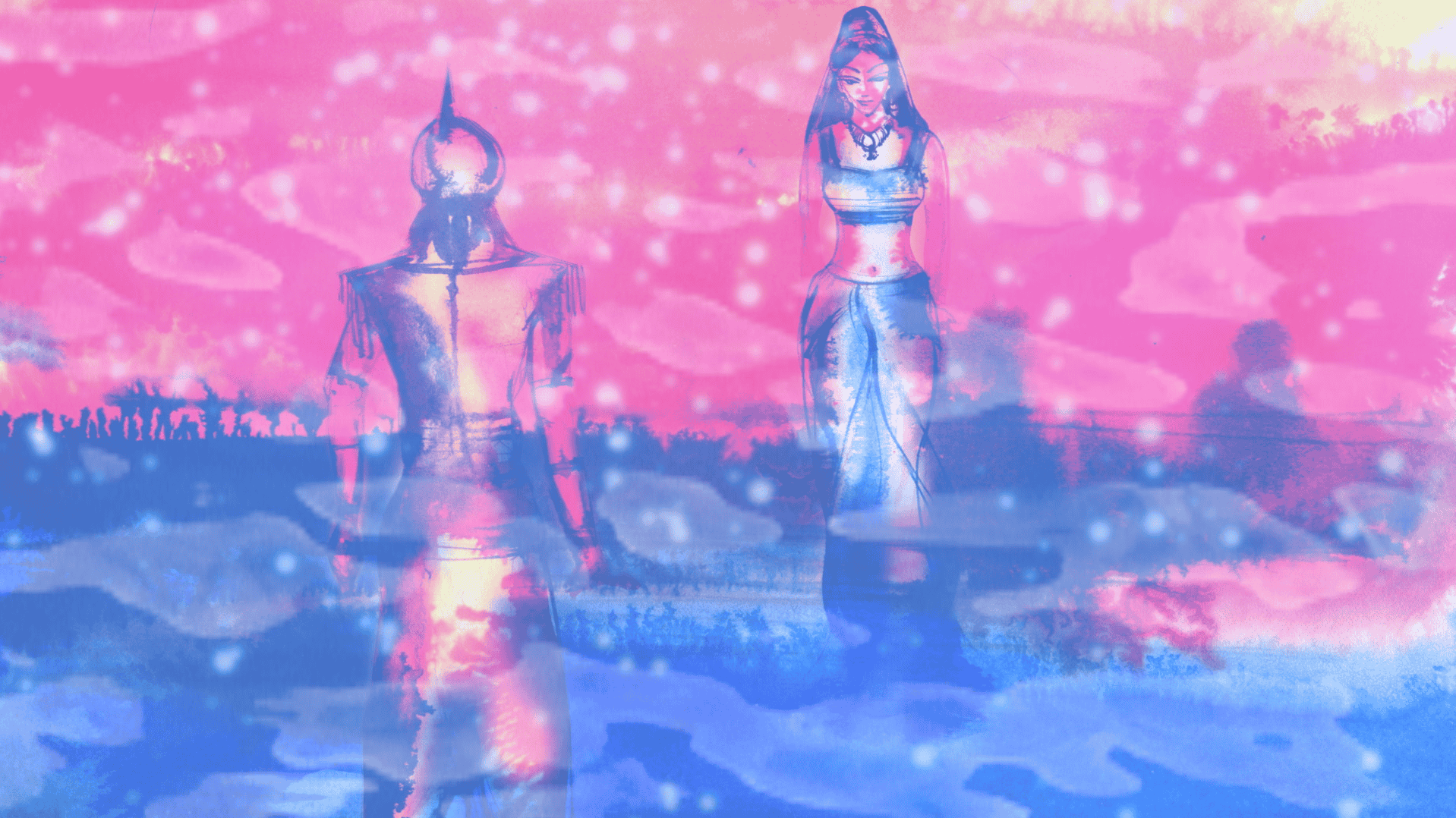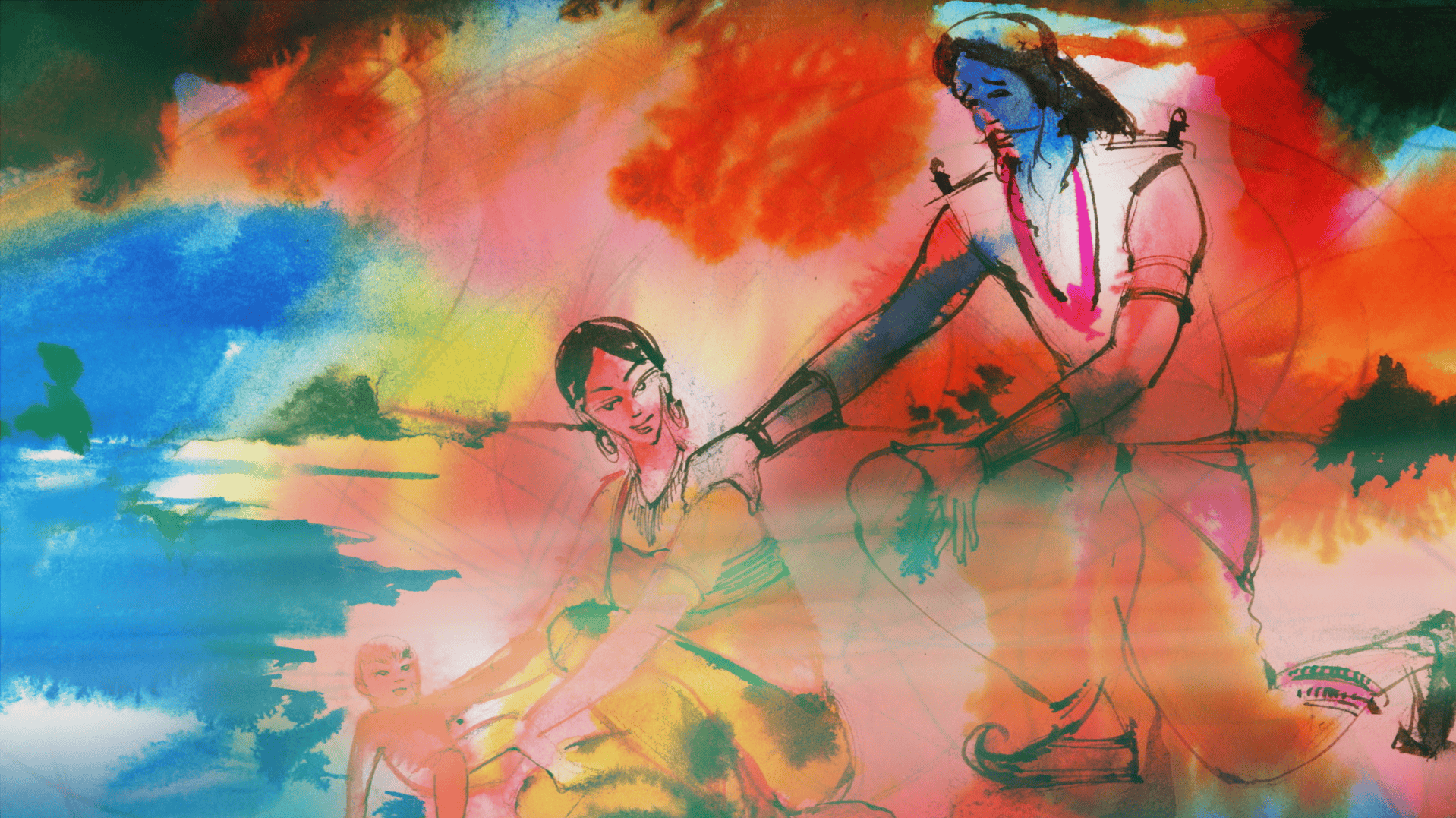

Sadhguru tells the story of King Shantanu’s desires and a son’s devotion so profound it led to an extraordinary vow – and the
making of Bhishma.
Sadhguru: Shantanu is the grandfather of the Pandavas and Kauravas. In his previous life, Shantanu was known as Mahabhishek; he lived a full life and entered Devaloka. He was sitting in Indra’s court when Goddess Ganga came visiting, and in a moment of unawareness, her dress slipped, exposing her upper body. All the other men put their heads down, but Mahabhishek, who was new to Devaloka, kept staring at her.
When Indra noticed this, he said, “You are unfit to be in Devaloka. Go back and be born a human being again.” Then he saw that Ganga seemed to be enjoying the attention, and he said, “This is completely inappropriate. You also go back. Be born human and go through all the pains and pleasures of being human. Return when you are free from this pride.”
So Mahabhishek was born as Shantanu. Shantanu was to meet Ganga. He had no memories of previous lives, but Ganga did. Ganga was trying to draw him towards her, but being a king, he wandered all over. Shantanu was a fine hunter. For him, hunting was worship; he became one with that act. The River Ganga was flowing by, but his attention was on the hunt.
Ganga waited. For weeks on end, he hunted on the banks of Ganga, not paying attention to her. One day, when thirst overtook him and no one was around to serve him, he thought of the river and came in search of Ganga. Ganga rose from the river as a woman. The moment he set his eyes upon her, he completely fell in love. Once again, love took over.
Shantanu pleaded with Ganga, “Please marry me.” Ganga set a condition: “I will marry you – but no matter what I do, you should never ask why.” Shantanu was so madly in love that he said, “Yes, I will never ask anything.”

She became his incredibly beautiful and wonderful wife. When she delivered their first son, she instantly took him to the river and drowned him. Shantanu could not believe that his wife drowned their firstborn son. His heart broke, but he remembered – if he asked why, she would leave. The man who had been floating in joy and love became grief-stricken and afraid of his wife, but he still loved her deeply.
When the second child came, Ganga again drowned him in the river. Shantanu was on the verge of insanity. He knew that if he said one word, she would leave. This went on until seven of their children had been drowned. When the eighth child was born, Shantanu helplessly followed Ganga to the river.
As she was about to drown this child too, Shantanu grabbed the infant and said, “Enough! Why are you doing this inhuman act?”
‘I will marry you – but no matter what I do, you should never ask why.’ — Ganga
Ganga said, “You have broken our condition. It is time for me to go, but I owe you an explanation. Let me tell you why.
‘Cowards always come up with excuses. You can’t get the cow, so you’re coming up with dharma.’ — Prabhasa’s wife
“You have heard of Sage Vashishtha, who had a cow named Nandini, which had divine qualities. One day, eight Vasus were visiting the planet with their wives. The wife of one of the Vasus, named Prabhasa, saw the sage’s special cow and coveted it.
“Unthinkingly, Prabhasa said, ‘Come, let’s get the cow.’
“Some objected, but Prabhasa’s wife said, ‘Cowards always come up with excuses. You can’t get the cow, so you’re coming up with dharma.’ Stung by her words, Prabhasa and his companions stole the cow.
“When Vashishtha realized that his dear cow was stolen, he cursed them, ‘How dare you! You come as guests, we treat you well, yet you steal my cow. May you be born as human beings with all the limitations – you have to walk the earth, carry physical bodies, you have to be born, and you have to die like everybody else.’
“So the eight Vasus begged me when I was cursed to be born human: ‘Let us be born in your womb and make our lives upon that planet as brief as possible.’”
‘You have broken our condition. It is time for me to go.’ — Ganga
Ganga continued, “I was only fulfilling their desire – they did not want to stay upon this planet. They just wanted to be born and be done with the curse. Seven I saved, but you saved the eighth one – Prabhasa, who instigated the theft. Maybe he deserves a longer life upon this planet, but because he is an infant, I will take him with me. When he turns 16, I will bring him back fully educated in everything he needs to be a good king.” She took the child and went away.
Shantanu became listless and lost, walking about forlornly, having lost interest in his kingdom. The once-great king became a frustrated, depressed man.
Sixteen years passed before Ganga returned with their son Devavrata and handed him to Shantanu. The boy had learned archery from Parashuram himself and the Vedas from Brihaspati. Devavrata returned as a full-grown young man, educated by the best teachers, and ready to take on great responsibilities.
When Shantanu saw him, all his depression went away, and he embraced his son with great love and enthusiasm. He crowned him Yuvaraj, the future king. Now that Devavrata took on the administration and was doing everything well, Shantanu became free and happy again. He went out hunting – and once again fell in love.
The fisher girl Matsyagandhi – she was called that because she smelled of fish – had grown up into a dark, dusky woman. Her father Dasa, the chief of the fisherfolk, had brought her up well, and she ferried people across River Yamuna. Shantanu was heading in that direction.
Meanwhile, Sage Parashar came to the riverbank, wanting a boat ride. As Matsyagandhi ferried him across, he was deeply drawn to this girl. This young fisher girl thought that making an association with the sage might get her somewhere. They went to live on a small island in the River Yamuna, and she bore him a child – Krishna Dwaipayana, named Krishna because of his dark complexion and Dwaipayana because he was born on an island.
Krishna Dwaipayana later came to be known as Veda Vyasa because he compiled the Vedas, and he is the teller of this story.
Parashar took the boy with him and went away. As a boon, Sage Parashar took away Matsyagandhi’s fishy smell and gave her a heavenly fragrance that no human being had ever smelled before. She smelled like a flower that did not belong to this earth. For this phenomenal fragrance, her name was changed to Satyavati.
When Shantanu met Satyavati, he fell in love with her. He went to Satyavati’s father and asked for her hand in marriage.
Dasa, the chief of the fisher folk, had some politics and calculation in him. When he saw the emperor begging for his daughter’s hand, he thought this was the time to make a deal. He said, “I would be willing, but only if my daughter’s children will become the future kings of the Kuru dynasty.”
Shantanu said, “That’s not possible. I have coronated my son Devavrata – he is an able young man and the best king the Kuru kingdom can have.”
This wily fisherman, seeing that the king was hopelessly in love, said, “Then forget about my daughter.”
Shantanu begged. The more he begged, the more the fisherman realized he had caught a big fish. He said, “It’s up to you. If you want my daughter, her children should be the future kings. Otherwise, go live happily in your palace.”
Shantanu returned to the palace, once again a depressed man. He could not shake Satyavati from his mind. Her fragrance had invaded him in such a way that he lost his mind and all interest in the kingdom’s affairs. He simply sat around.
If you want my daughter, her children should be the future kings. — Dasa, the fisher chief
Devavrata, being a dutiful son, asked, “Father, what’s bothering you? Everything is going great in the kingdom.” Shantanu just shook his head and hung it in shame, unable to tell his son what was troubling him. Devavrata went to the charioteer who had taken Shantanu hunting and asked, “What happened? After this hunt, my father is no longer the same man. Something has happened to him.”
The charioteer said, “I don’t know what happened. I took him to the fisher chief’s house. Your father walked into the house as a king – with great enthusiasm and full of love. I could see he had fallen in love with the fisher chief’s daughter. But when he came out, he was like a ghost.”
Devavrata went there to find out what had happened. Dasa said, “He wants my daughter, and I want her children to be the future kings. It’s a simple condition, but you are standing in the way.”
Devavrata said, “That is no problem. I promise I will never be king. Let Satyavati’s children be the kings.”
The fisherman smiled and said, “As a young man, you can say these things out of your bravado. But once you have children, they will fight.”
Devavrata declared, “I will never marry and have children to ensure that Satyavati’s children will have the right to be kings.”
The fisherman looked at him and said, “Young man, I appreciate what you’re saying, but you do not know the ways of life. You may not marry, but you may still have children.”
Then Devavrata took the extreme step of castrating himself and vowed, “I will never have children. I’m incapable of having children. Will this satisfy you?”
The fisherman said, “Yes.”
‘I will never marry and have children.’ — Devavrata
Everyone said, “This is the harshest thing a man can do to himself.” So they called him Bhishma – one who willingly subjected himself to the harshest treatment.
And Shantanu married Satyavati.

